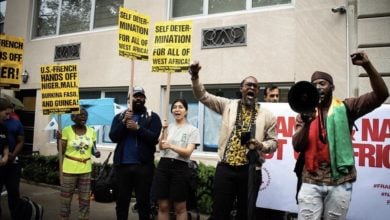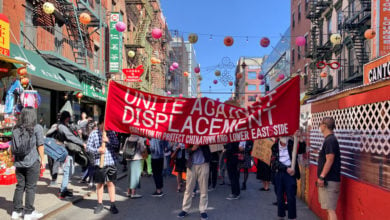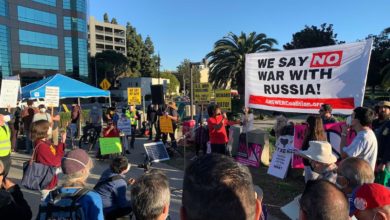 The U.S. occupying troops guard ballots from the Iraqi elections. Photo: Hrvoje Polan |
Can an election be “free and fair” under conditions of military occupation? The question seems almost too obvious to need an answer.
Yet the corporate media in the United States unanimously hailed the Jan. 30 “election” in Iraq as “a historic step,” or “a turning point in the country’s history.” Although Iraq has had a number of elections over the past 80 years, virtually every major media outlet maintained that this one was a first for the country.
The Jan. 30 election was a key element in Washington’s Iraq strategy. It represented part of its attempt to find a way out of the increasingly serious crisis for the U.S. occupation. The election tactic was aimed at public opinion in both Iraq and the U.S. It was no accident that it took place just three days before Bush’s Feb. 2 State of the Union speech.
The Bush administration is hoping that the election will produce a more credible but still compliant Iraqi government that will allow the U.S. to begin pulling back from its huge and unsustainable deployment, while still retaining control of the country.
There are today at least 150,000 U.S. troops in Iraq, along with more than 25,000 from other countries. In addition, 20,000 mercenaries disguised as “private security” forces are deployed. That comes to nearly 200,000 foreign troops occupying a country of 28 million people.
U.S. helicopters, tanks and other armored vehicles are everywhere, controlling key economic and strategic points along Iraq’s borders. That hardly fits the description of a “sovereign country.”
Iraqis have suffered unimaginable losses over the past 15 years of U.S./UN war and economic blockade. More than one million Iraqis—mostly young children, sick and elderly people—died as a result of the sanctions/blockade imposed on the country from 1990-2003.
Conditions of life have further worsened since the U.S. invasion in March 2003. Nearly two years of war have left 100,000 Iraqis dead and the Iraqi political and social structure in shreds. Unemployment stands at 70 percent. Electric power in the energy-rich country is available only for a few hours a day.
Iraqis were told that the election would signal improved living conditions and the beginning of the end of the U.S. occupation. The occupiers sold the election as a way out of an increasingly desperate situation. In this respect, it bore a similarity to the election in Nicaragua in 1989.
Voting at gunpoint
For ten years after the triumph of the 1978 Nicaraguan Revolution, the U.S. organized, funded and armed a counterrevolutionary terrorist army to attack that country. The Contras, as they were known, carried on a campaign of destruction, torture and murder against the population of a small, poor country.
After a decade of terrorism sponsored by the Reagan administration, the Sandinista government held elections in 1989. The U.S. poured in millions of dollars to counterrevolutionary opposition politicians, who were allowed to campaign freely.
The message from Washington to the Nicaraguan people was undisguised: Vote for the Sandinistas and we will continue to wage terrorist war against you. Vote for the U.S.-backed candidate and a new era of peace and prosperity will ensue.
The Sandinistas lost the 1989 elections 54 percent to 46 percent and turned over power to the U.S.-funded opposition. Former U.S. President Jimmy Carter, who observed the elections and is often mistakenly seen as having progressive credentials, proclaimed four years later to Democrats and Republicans: “Together we removed the Sandinistas from power.”
Instead of ushering in good times, the right-wing victory in Nicaragua was followed by a dismantling of all the health, education and social programs of the revolution. Conditions for the Nicaraguan people rapidly deteriorated.
To call elections staged in the midst of imperialist-imposed war and extraordinary deprivation “free and fair”—whether in Nicaragua, Iraq or anywhere else—is the height of cynical deception. It’s more like voting with a gun to the head.
‘Good elections’ and ‘bad elections’
Not that the Washington establishment is always a big fan of elections. For example, two years after the first democratically elected government of Mohammed Mossadegh took power in Iran in 1951, the CIA overthrew it. For 25 years after the overthrow, the Shah ruled Iran as a kingdom on behalf of the U.S. oil companies and the Pentagon. More than 100,000 Iranians were tortured and killed by the SAVAK, the U.S.-trained secret police, during those years.
In 1954, the CIA overthrew the elected government of Jacobo Arbenz in Guatemala, ushering in a reign of terror that killed 200,000 Indigenous people over the next four decades. In 1973, the CIA directed a military coup in Chile against leftist president Salvador Allende. The bloodbath that followed killed tens of thousands, drove over a million Chileans into exile, and ruthlessly destroyed the powerful socialist and communist parties.
This list is by no means exhaustive: U.S. invasions, coups and covert operations have overturned countless governments over the past century. Nor is it a thing of the past. In 2002, the U.S. supported a coup attempt against democratically elected President Hugo Chavez, who is at the head of a revolutionary process in Venezuela.
The point is that U.S. leaders organize or demand elections when they fit in with their overall strategy toward a particular country. They are equally at ease intervening to negate the outcome of an election that conflicts with their plans.
In Iraq, the U.S. planned, organized and created the entire apparatus for administering the Jan. 30 vote. The Iraqi election commission was created, like all other Iraqi governmental bodies, by the U.S. embassy, headed by Ambassador John Negroponte. Negroponte, it should be recalled, was the U.S. ambassador to Honduras from 1981 to 1985 and played a key role in organizing fascist death squads in that country and neighboring Nicaragua.
Millions honor boycott
All information released by Iraqi election officials must be viewed in light of this complete control by U.S. officials. Take, for example, the question of how many Iraqis voted.
The Iraqi resistance movement, which is made up of many different currents, called for a boycott of the elections. It viewed the election as just another step in the U.S. plan to pacify and subjugate the country. So, the issue of voter turnout was a rough gauge of the resistance’s support.
At first, on Jan. 30, press releases announced that voter turnout was 72 percent. Within hours, however, this estimate was lowered to 60 percent—a huge discrepancy. Subsequently, the discussion of voter participation turned very murky. The fact that the figures have gotten more confused as more votes were counted make the final accounting highly suspect.
Many commentators noted that the figure of 8 million Iraqis voting was exactly the figure that was “expected” before the election. Others noted that even that figure, which is quite possibly fictitious, represents 57 percent of registered voters, but only 44 percent of eligible voters.
At the same time, there have been numerous reports that voters were threatened with a cut-off in food rations if they failed to vote. InterPress correspondent Dahr Jamail, quoted Amin Hajar, 52, the owner of an auto garage in Baghdad: “I’ll vote as I can’t afford to have my food ration cut. … And if that happens, I and my family would starve to death.”
Millions of Iraqis, particularly those living in the central, western and northern parts of Iraq boycotted the election. Whole towns stayed away from the polls.
An Iraqi worker quoted on the day of the election gave his reason for boycotting: “This is a farce. The Americans have already decided who the next prime minister will be.” The current Iraqi “prime minister,” Ayad Allawi, is a longtime CIA agent appointed to his position by Washington.
There has been no letup in the Iraqi insurgency in the aftermath of the election. Heavy fighting was reported in many areas in the days following Jan. 30. And on election day itself, a giant C-130 British military transport plane was shot down, the first loss of such an aircraft reported by the occupying forces.
 U.S.-imposed ‘democracy:’ sham elections amid brutal repression and occupation. Photo: Travis Heying |
The Bush administration has never wanted an indefinite occupation of Iraq involving hundreds of thousands of U.S. troops. Before the invasion, they believed that they would be able to quickly conquer and pacify Iraq. The invading troops would quickly be available for deployment against the next targeted country—Iran, Syria, Lebanon, North Korea, Cuba, Venezuela, or elsewhere. What they did not anticipate was the rise of a broad-based and fiercely determined resistance movement. That resistance has inflicted heavy casualties on the occupation forces.
U.S. losses stand at more than 1,400 killed and over 25,000 suffering from serious wounds, injuries and illness. More than $300 billion has been appropriated for the war. The Pentagon is spending about $200 million every day in Iraq.
The Iraqi resistance can exist only with widespread popular support. It has prevented the imperialist juggernaut from moving on in its quest for world domination.
The U.S. aim in Iraq throughout the last 15 years of bombing, blockade and invasion under Bush I, Clinton and Bush II was to demolish the old Iraqi state and government, and create in its place a subjugated Iraq completely dependent on Washington. The official U.S. policy of seeking a “democratic, federal state” in Iraq refers to a plan to have Iraq effectively divided into northern, southern and central administrative regions, linked together under a weak national government.
The Pentagon is planning to keep 14 large permanent bases in Iraq that could be used as a forward staging ground for new aggressions against other countries of this oil-rich region, as well as securing U.S. domination over Iraq’s vast petroleum reserves.
To the Washington war-makers, the Jan. 30 election is a step in their plan to maintain domination of Iraq, while freeing up U.S. forces for other aggressions. They hope that the election will legitimize the new regime and encourage more Iraqis to join a new U.S.-led Iraqi army and police. They are trying to “Iraqize” the occupation, in the same way the U.S. attempted to “Vietnamize” the war in Vietnam three decades ago. They are trying to enlist one sector of the Iraqi people to fight against the others on behalf of U.S. interests.
But there is little confidence in the halls of the White House and Pentagon that this plan can succeed, especially given the experience of the past several months. Thousands of Iraqi police and soldiers have refused to fight their own people. On Feb. 3, Deputy Secretary of Defense and Iraq war architect Paul Wolfowitz told a congressional committee that Iraqi military units “on average had absentee rates of 40 percent.” Put more bluntly, by the Pentagon’s own statistics, which are undoubtedly low, 40 percent of Iraq’s new puppet military has deserted.
Despite all that the U.S. rulers have invested in the process, elections will not be the decisive factor in Iraq. The fate of the imperial project will instead be determined by the struggle on the ground between the forces of occupation and the Iraqi popular resistance.






